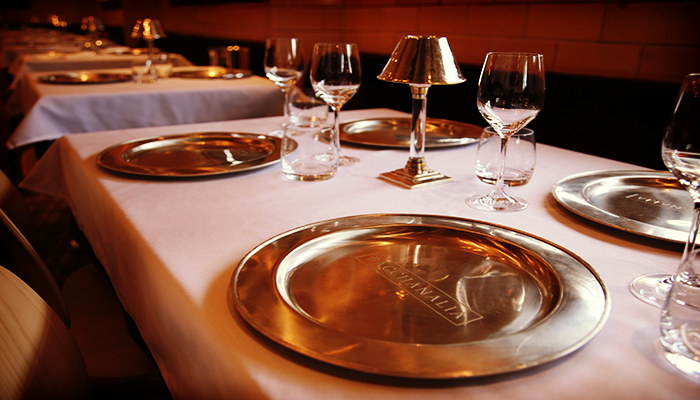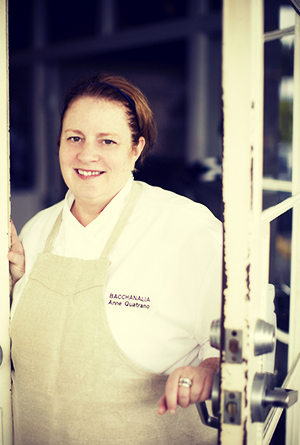
If you didn’t know Atlanta’s Westside area very well, you’d probably pass right by Bacchanalia. Situated as inconspicuously as a Forbes Travel Guide Four-Star establishment probably can be — Bacchanalia sits in a shopping center alongside high-end boutiques, casual eateries and a gourmet ice cream shop — the restaurant elects not to make a big deal with manicured walkways or valet parking. And for 14 near-flawless years, that’s exactly how chefs and co-owners Anne Quatrano and her husband Clifford Harrison have liked it. (The establishment, which actually opened in 1993, moved from its original Buckhead location in 2000.) However unfussy the exterior, inside the eatery remains a showcase of elevated cuisine, industrial décor and service that moves at a balletic pace.
Chef Quatrano hops about with similar grace, going from Bacchanalia to her other restaurants, Four-Star Quinones at Bacchanalia, Abattoir and Floataway Café, every day to ensure that kitchens are running smoothly. On September 12-13, though, the toque’s duties will involve teaming up with fellow culinary trailblazer Barbara Lynch for a dining event on the Atlanta stop of the James Beard Foundation’s Taste America tour. During a rare break in her day, Quatrano was gracious enough to speak to us about Lynch, life and loving her job.
What is a typical day like for you?
I go to every restaurant every day. I try to see everybody every day. Some of the prep takes place at Bacchanalia. Our bread preparation [takes place there]. So, we also purvey for the other restaurants. I travel to the restaurants to bring them product. Usually, my mornings start with preparations at Bacchanalia. My afternoons are usually at the other two restaurants, Floataway and Abattoir. And then I’m back at Bacchanalia at night.
What do you love most about cooking for other people?
I love it when they’re happy. I don’t love it when they’re not. I think you have to have a certain personality to be a good chef. You have to have a high tolerance for stuff and a good work ethic. But you really need to enjoy pleasing people. You have to be a people pleaser.
Was there a particular time in your life, or even a moment, when you felt that passion for pleasing could turn into a career?
I’m not sure if there was a particular moment, but ever since I was a kid, I liked to feed people. My mom didn’t really like to cook, but I had a paternal grandmother who really liked to cook. I spent a lot of time with her. I think that how people reacted to her cooking and how they received her cooking and my other Italian aunt’s cooking made me want to cook.
Why was it so important for you to be a part of the James Beard Foundation’s Taste America tour?
The James Beard Foundation has always been very important to me. It’s always been important that there is a foundation in this country that recognizes people that do what we do. I know how important it was to me as a young chef to be recognized. That makes me want to keep the foundation going and keep the grants and scholarships to young culinary artists going, and keep the recognition of chefs going. I do whatever they ask me to do. I’m a sucker for the James Beard Foundation. But I have to say, what sweetened the pot for this event was being able to cook with Barbara Lynch, who I have so much respect for. I’ve known her since we were both starting out. I find that to be a great synergy, being around her.
Speaking of Lynch, you and she have made quite the imprint in a male-dominated industry. What advice would you give aspiring female chefs out there about making it in the culinary world?
Work harder than they do. [Lynch is] the epitome of that. I know we’ve both worked hard with women chefs and restaurateurs for years. I know she’s felt a little more of the male dominance in the industry, especially in Boston and cooking Italian food. I did a bunch of my culinary grinding in San Francisco and five years in Manhattan. During my time in San Francisco in the ’80s, I could name 20 chefs at that time. San Francisco was really, really ahead of its time. When I got to New York in the late ’80s and early ’90s, it kind of seemed like people wanted women in their kitchen. I think they wanted to catch up. It was kind of popular. I think many women could do what a lot of our male chefs do, but I think they’ve chosen other routes, to have a family or whatever. I think that probably makes it a little bit harder to spend the amount of time it takes to do this right.
How has Bacchanalia been able to keep up 20-plus years of dining excellence?
It’s kind of like it’s alive. You have to feed it. And we do. I think that it’s important enough to me and my partner Clifford that we’re involved and there and a part of it. That makes the difference. We’ve always been committed. And we’re lucky. We’re very, very fortunate. We’re fortunate that we get great ratings. We’re fortunate that we don’t have partners. We’re fortunate that we both love what we do. Because of all of those reasons we’re able to really put the finances of the business where we want them to be — which is in the quality of our products and the quality of our chefs. I think we have that luxury because we’re not paying money to other people that probably want to make a whole lot more than us. We’ve always just wanted to have great businesses and make great food. That’s been our priority all these years.
What are the emotions you want people to leave with after they’ve eaten at Bacchanalia?
We always want people to say, “When can I get back here?” That’s our goal. We want you to enjoy the experience enough to think about your next big event. Bacchanalia is a celebratory restaurant. I think that’s what we find at every table almost every day; that people are there for a reason. It’s a new job or an anniversary. It’s a restaurant for celebrating your big occasions. I don’t think there are a lot of places like that right now in Atlanta. We’re growing almost all of our produce. We try to do just enough to it to make it really interesting and beautiful on the plate and then we put it in front of you — and the same with our protein. We hope that you leave and think that you’ve had a culinary experience that you would like to repeat. That’s what we’re looking for.


